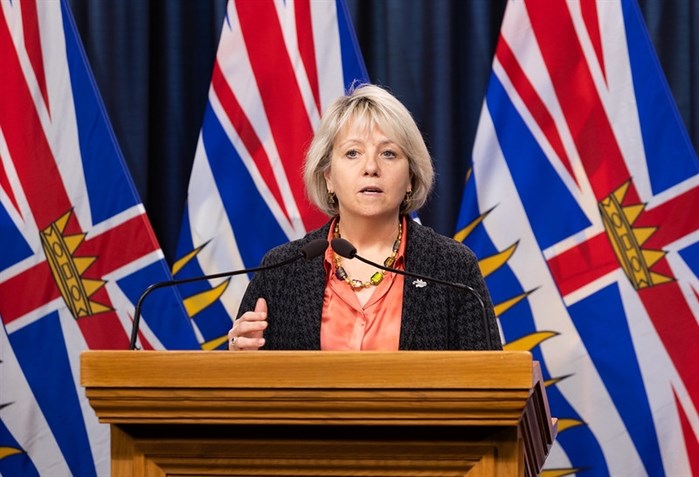
Provincial health officer Dr. Bonnie Henry.
Image Credit: Flickr/Government of B.C.
January 21, 2022 - 11:53 AM
While COVID-19 case counts have peaked in B.C. it’s still rampant in the community so people should assume they have been exposed to it, provincial health officer Dr. Bonnie Henry said during a news briefing today, Jan. 21.
The good news is that it’s much less likely that people getting COVID with the Omicron variant will need to be hospitalized, especially if they are vaccinated.
“We cannot eliminate all risk,” Dr. Henry said. “The virus has changed and has become part of what we are going to be living with for years to come.”
Her response to the Omicron variant has also changed. For one thing, contact tracing, which was a cornerstone to the earlier response to COVID, is no longer effective since the incubation period is so much shorter.
READ MORE: COVID-19: A timeline of the pandemic and how it changed our lives over the past two years
Another change is that people who have mild or no symptoms at all do not have to isolate for 10 days, if they are vaccinated.
“At this time, everyone, all of us, need to routinely check ourselves every day,” Dr. Henry said. “Self-monitor and, if we have symptoms that might be influenza, that might be COVID, that might be a cold, we need to stay home until we feel better.”
That may be for five days if it seems like it’s COVID for a vaccinated person. It could be for even shorter periods of time.
“The rule of thumb, and what we all need to pay attention to right now is, if you’re feeling unwell, stay away from others and return to normal activities when you’re feeling better,” Dr. Henry said.
“Particularly if you have a fever, you need to stay home and stay away from others. But if you have a mild illness like a sore throat or the sniffles, stay home and if you feel better the next day, then you can go back to school or to work or to childcare.”
Older people, especially those over 70, are more prone to getting sick enough to need hospitalization, as are those with certain health conditions and those who are unvaccinated. Those are the only ones who need to get COVID tests.
READ MORE: Don’t dismiss Omicron variant of COVID as a mild illness: Dr. Henry
“Most people now do not need testing for COVID,” Dr. Henry said. She also noted that 70% of those being tested don’t have COVID and the tests are in short supply.
This doesn’t mean that the pandemic is over.
“This is not where we want to be when we are living in an endemic state,” Dr. Henry said, noting that there are still strict restrictions on social interactions in the province to minimize the spread of the virus, especially to those vulnerable to serious illness.
She refuses to call Omicron a mild illness but is hoping, as this wave of infection passes, future variants of COVID will, in fact, be mild and allow people to return to a more normal way of life.
That may mean that people with immune compromised systems ay need to get further booster shots but it may also mean that, for most people, three doses will be all that’s needed.
“I do hope we do end up with another coronavirus that causes mostly mild illness,” Dr. Henry said. “We are preparing for: how do we live with this when we no longer need these restrictions that we have in place right now?”
To contact a reporter for this story, email Rob Munro or call 250-808-0143 or email the editor. You can also submit photos, videos or news tips to the newsroom and be entered to win a monthly prize draw.
We welcome your comments and opinions on our stories but play nice. We won't censor or delete comments unless they contain off-topic statements or links, unnecessary vulgarity, false facts, spam or obviously fake profiles. If you have any concerns about what you see in comments, email the editor in the link above.
News from © iNFOnews, 2022